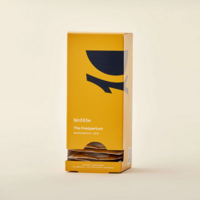While postpartum depression can manifest itself differently for every person, it can begin pretty quickly after birth — and can make it almost impossible to do all the daily tasks required of a parent.
For Katlyn*, a 24-year-old full-time student from Ohio, it all happened about a month or so after her now three-year-old son was born. Not only were her anxiety levels through the roof, but she couldn’t bring herself to do anything she used to enjoy (like horseback riding) and she was barely taking care of herself. It was a chore even to take a shower. She was taking two antidepressants but still dragging through her days and so consumed with trying to parent and without asking for too much help from family — she felt like she had no one to reach out to who understood that she wasn’t just “being lazy.” One day, Katlyn was mindlessly scrolling on Facebook, and an ad popped up for a clinical trial. It was for Zurzuvae, a newly FDA-approved oral medication specifically for treating postpartum depression.
Medication is not always a “magic bullet” treatment for any mental health condition, but for certain people, including Katlyn, it can be a game-changer. Here’s what you should know about the new postpartum depression pill and how it works.
How does zuranolone affect your postpartum depression symptoms?
Zurzuvae is a form of zuranolone, a neuroactive steroid that’s known to work pretty quickly. “In terms of clinical data, we know that patients respond by day three of treatment, which means they have a 50% decrease in symptoms of depression, and symptoms continue to improve up to 28 days, a full two weeks after ending the treatment,” explains Rachel Dalthorp, MD, a psychiatrist based in Moore, Oklahoma.
Katlyn experienced similar results: She took the standard two-week course of the medication during the clinical trial, and started to feel better by the third or fourth day. For her follow-up appointment to check in on her progress, “I walked in there and had some pep in my step,” Katlyn says. “I was not even the same person.” She eventually was able to get off all medication after taking the full dose, waking up feeling rested, motivated, and able to take care of herself and her son.
How does zuranolone work, exactly? That’s partially what scientists are still researching. “This medication works to protect the brain from the effects of stress,” says Dr. Dalthorp. Pregnancy and birth can cause stress to begin with, and people who either have a history of trauma, a lack of support, or interpersonal issues may have a higher risk of depression due to those stressors, Dr. Dalthorp says. The goal of the medication is to stave off depression by helping the brain cope with the stressors associated with becoming a parent.
Who is the right candidate for PPD medication?
The symptoms of postpartum depression are similar to major depressive disorder, including depressed mood, loss of interest in things that were previously enjoyable, guilt and shame around disinterest in parenting, sleep issues, fatigue, hopelessness, changes in appetite, and concentration issues. They tend to be different from the anxiety, restlessness, and crying spells of baby blues, which can affect up to 85% of new parents and often last for about two weeks after birth. Postpartum depression also can start in the first few weeks after birth, but it tends to last longer.
Postpartum depression is associated with no longer being pregnant, and can also occur in situations of pregnancy loss. “You don’t have to get to the finish line to have the baby—you still have a postpartum period,” says Dr. Dalthorp. If there was a pregnancy and the pregnancy ends for any reason, doctors consider depressive symptoms that fit the criteria and begin in that period to be postpartum depression, and zuranolone can be a possible treatment, in conjunction with therapy, she adds.
Is there anyone who should not take medication for PPD?
The main contraindication to taking Zurzuvae is being pregnant again: Dr. Dalthorp explains that there has not been enough research for how the medication could affect pregnant people yet (contraception is recommended while you take it). If you’re taking other medications such as those that treat liver or kidney disease, let your doctor know so that they can be mindful of the dosing of zuranolone.
Know that it’s best to take Zurzuvae at night with a healthy meal of 25% fat (think salmon or avocado toast) and that you shouldn’t drive for 12 hours after taking it for risk of sedation. Dr. Dalthorp emphasizes that it is safe to take Zurzuvae while breastfeeding, if you choose to breastfeed. “We know that not treating a mom’s depression is more harmful than exposing a baby to anything that treats depression,” Dr. Dalthorp says. “Getting treatment for depression is doing what’s best for yourself and the baby.”
*Last name is omitted to protect privacy.
Mara Santilli is a journalist reporting on health and wellness and how social and political systems influence the well-being of certain groups, including but not limited to Black and brown communities, women, and the LGBTQ+ community. Her editorial work has appeared in publications such as Shape, Marie Claire, Cosmopolitan, Women’s Health, InStyle, Glamour, and more. Outside of reading and writing, she enjoys traveling (especially to Italy), singing, dancing, musical theatre, and playing guitar and piano.

.jpg)











.jpg)

%20Premium%20Subscription%20Bundle%20Muse%E2%84%A2%20EEG-Powered%20Meditation%20&%20Sleep%20Headband.png)





%20Health%20&%20Household.png)

